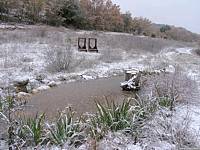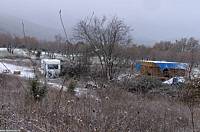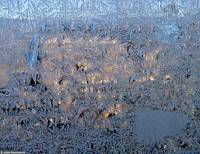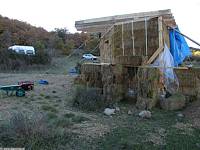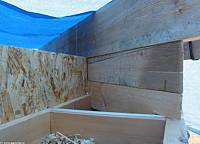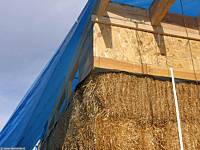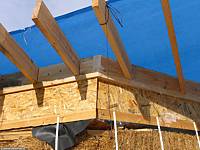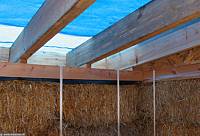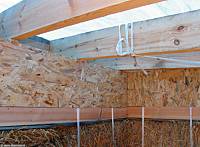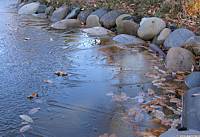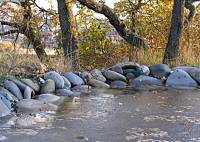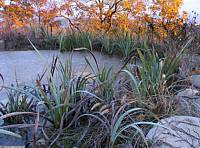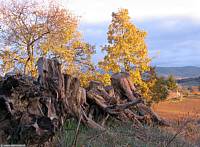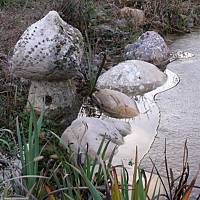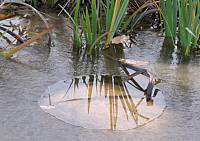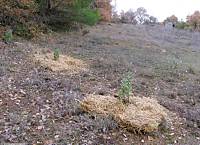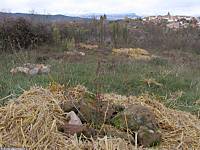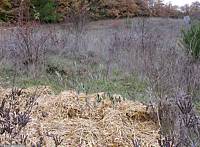|
|
Nature
Switched On
|
|
|
introduction |
2008 November 28, 29 & 30, Friday to Sunday Another challenge to face for the
still unfinished garden house: snow. Snow itself is not such a
problem but when it starts to melt all kinds of unpredictable things
happen on the roof with the temporary ill-fated PE sheets. We had
again some leakage inside the house. The water damage is mainly
limited to the wooden floor (with the straw infill) as the str
Perhaps we should have bought one decent big strong canvas by now but I think that next week we will be able to finish the roof with the EPDM sheet (althoug this is something I also thought a couple of weeks ago..) |
|
|
Looking at the garden house through a
caravan window. |
Looking north-west Saturday 9:49 |
|
|
Last week (22 November) we finished the placement of the roof beams (although we still have to add the lateral lookouts) and fixed most of the vertical OSB boards on the ring beam. Because of the slightly tilted ring beam (commented on 15 November) we had to readjust the supporting structures. Eventually the roof is quite level now, for the moment.
|
||
|
The last roof beam has been fixed. |
Details of the ring beam (below)
with a fixed roof beam on top. Notice the adjustment of the beam
angle, to maintain a 5º slope. Photograph taken on 23 Nov.12:48 |
|
|
Right under these boards we fixed a strip of wood to act as an edge for the plaster that will be applied up to this height. The vertical OSB boards will be completely covered with plaster, although an additional mesh of chicken wire will have to be placed because the earth plaster can't attach to wood.
|
||
|
West corner of the garden house, with the bird
blocks in place with a strip underneath |
A difficult corner of 45º. Unfortunately we had also placed
some bales in bad shape in this section, which had to be corrected
with inserted boards. |
|
|
Inside east corner. |
Inside west corner Sunday 14:27 |
|
|
Snow, ice and frost always create interesting patterns and forms,
especially in and around ponds. Even a simple and recently installed
pond can be an endless source of this kind of art, changing every
minute and every angle of view.
Simplicity in design and the growing of few different, spontaneous
species is an advantage here, and so is a large water surface; quite
different from the typical common garden pond with its overkill of species,
colours and structures were you can hardly see any stretch of clear water.
|
||
|
Lower pond, looking north. |
Lower pond, looking east, with
some almond and oak trees in the background. Sunday 8:42 |
|
|
Higher pond, with Iris pseudacorus,
looking north-east.
|
A collection of olive and almond
trunks near the higher pond, looking north-east. Sunday 8:34 |
|
|
The red tinged plant on the shore of the higher
pond is the common 'weed' Polygonum
aviculare (Common
Knotgrass), here growing to a surprisingly aesthetical effect. Birds
appreciate its seeds.
|
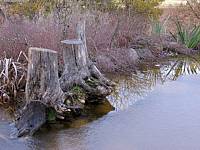
|
The melting zone near the shore and around stones is
especially fascinating. |
|
Higher pond. |
||
|
I managed to free some time for garden work. Following the
ideas of permaculture I commented on
last time, I continued
applying mulching with straw; this time on some plants I planted
this spring. The mulch
will maintain these plants warmer in winter, suppress competing
plants, maintain humidity and stimulate soil life.
Unable to suppress completely my own scientific roots, I decided to
set up an experiments, applying the mulch to only 60% of the
number of plants of the same species with the same development. The
species experimented on are: 5 Berberis vulgaris (Common
barberry) plants which have survived the summer with some
difficulty, and 5 plants of |
||
|
Higher, western terrace with 3 plants of
Cistus albidus tugged in with straw. |
||
|
Lower terrace with 3 plants of Berberis
vulgaris with straw mulch and 2 plants with only a circle of stones. |
||
|
This olive tree (cultivar 'Pascual')was planted 2
years ago but hasn't grown much. Perhaps the mulch will give him a
boost. Higher terrace, looking west. Sunday 15:22 |
||
|
introduction
|
|
